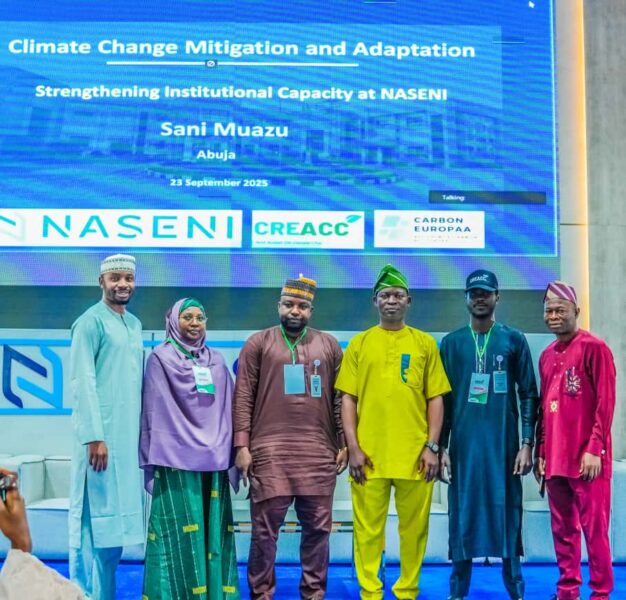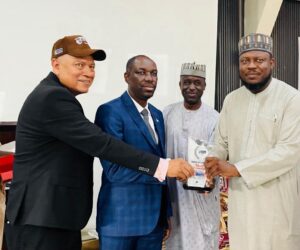Climate change has emerged as one of the defining challenges of 21st century, a global crisis whose impact spares no nation, and Nigeria is no exception. From the drying up of Lake Chad and erratic rainfall patterns that threaten food security to the floods sweeping through riverine communities each year, the signs are visible and alarming.
Nigeria’s dependence on fossil fuels, coupled with deforestation and poor waste management practices, continues to accelerate environmental degradation. Yet, amid this daunting picture, one institution is quietly driving technological transformation that places sustainability at the heart of national development. That Agency is the National Agency for Science and Engineering Infrastructure (NASENI).
Through innovative projects in renewable energy, green manufacturing, transport, and clean technology, NASENI is redefining what climate action can look like when science and engineering meet vision.
SPONSOR AD
Established to provide the critical science, technology, and engineering backbone for Nigeria’s industrialization, NASENI has, over the years, evolved beyond its initial mission of developing local infrastructure. The Agency’s work today is inseparable from the global push toward sustainability and the reduction of carbon emissions.
Speaking recently at a seminar on climate change and green economy sustainability, held at the Agency’s headquarters, the Executive Vice Chairman/CEO, Khalil Suleiman Halilu, reaffirmed the Agency’s commitment to driving Nigeria’s transition to a sustainable climate action and green economy.
He noted that NASENI was established to provide the science, technology, and engineering backbone for Nigeria’s industrialization, stressing that the Agency’s mandate of research, development, and technology domestication is increasingly tied to the global fight against climate change.
“Our mandate to drive Nigeria’s industrialization is increasingly tied to the global imperative to combat climate change and build a green, sustainable economy. Every innovation we develop must not only enhance productivity but also protect our planet. Every solar system installed, every tractor restored, every clean cookstoves produced, and every CNG vehicle conversion is a step toward industrial growth that is also climate-resilient,” he stated.
Highlighting NASENI’s ongoing projects, the EVC pointed out several key initiatives ranging from renewable energy, which has to do with assembling and distributing solar home systems, producing solar panels and lamps locally, and promoting access to clean power. Clean Cooking Solutions, which also provides energy for cooking through the Power stove Limited and NASENI, which produces clean cookstoves and biomass pellets to reduce carbon emissions, improve public health, and unlock carbon credit opportunities.
Other climate-smart projects which NASENI is working on include Argo-Tech and fertilizers production that help in developing organic and coal-based fertilizers to strengthen food security while reducing emissions from chemical fertilizers. Speaking further on transport and energy transition, the EVC said NASENI is supporting CNG/LPG auto conversion and fueling stations as alternatives to petrol and diesel.
On Digital & Smart Manufacturing, he said the Agency is advancing local production of laptops, tablets, drones, and smart devices with sustainability at the core of design. He also highlighted the Asset Restoration Programme (ARP), which refurbishes idle government infrastructure to reduce waste, cut costs, and extend the life-cycle of critical assets, an approach described as both cost-effective and climate friendly.
This statement reflects paradigm shift, recognition that technology and environmental stewardship must go hand-in-hand. NASENI’s interventions now cut across renewable energy, sustainable agriculture, clean manufacturing, and transport electrification, forming a crucial bridge between development and climate responsibility.
To understand the importance of NASENI’s role, it is necessary to appreciate the scale of Nigeria’s climate crisis. As Africa’s most populous nation, Nigeria faces a complex web of environmental vulnerabilities: desertification in the north, coastal erosion in the south, and increasingly unpredictable weather patterns that affect millions of livelihoods.
According to the National Emergency Management Agency (NEMA), the 2022 floods displaced over 1.4 million people, destroyed farmlands, and caused losses estimated at over ₦2 trillion. Meanwhile, the gradual desert encroachment across the Sahel continues to threaten agriculture and force rural migration.
Energy use is another major driver with reports showing that over 80 million Nigerians still lack access to electricity, relying heavily on firewood, kerosene, and diesel generators — all of which contribute to greenhouse gas emissions. The need for a clean energy transition is not just an environmental necessity; it is an economic and social one.
In northern Nigeria, the problem is becoming severe. Many rivers and streams that once provided water for farming and grazing are drying up. The lands that used to produce grains and vegetables are turning into dry, cracked soils. As farmers struggle with shorter rainy seasons, some have been forced to abandon their farms altogether. This growing drought is also speeding up desert encroachment, especially in states like Borno, Yobe, Sokoto, and Katsina.
At the same time, the north is losing trees to deforestation.Many rural dwellers depend on firewood for cooking and cut down trees for farming or construction. Without trees, the land can no longer hold water or resist erosion. The result is hotter temperatures, poor soil, and a decline in food production. Experts say deforestation in Nigeria is happening faster than in most African countries, worsening the effects of climate change.
In the southern and middle parts of the country, flooding has become another major disaster. Heavy rains now destroy farmlands, homes, and roads every year. According to official reports, over half of Nigeria’s farming areas are at risk of flooding. In recent years, floods have submerged more than 100,000 hectares of farmland in states like Bauchi, Taraba, and Jigawa.
These floods not only wash away crops but also make it hard for farmers to replant, forcing many families into hunger and poverty. The agricultural sector has suffered huge losses. The National Bureau of Statistics (NBS) estimated that flooding in 2022 alone caused over N577 billion in damages to farms and rural communities. The loss of crops and livestock pushes food prices higher, while poor yields reduce farmers’ incomes.
For a country where agriculture employs a large portion of the population, these changes are already hitting hard on people’s livelihood. In coastal areas, the story is different but equally worrisome. Sea levels are rising, and erosion is eating away at communities along the coast. Parts of Lagos, Delta, and Bayelsa States face serious threats of flooding and land loss. Experts warn that without strong protective measures, some communities might disappear under water in the next few decades.
This is where NASENI’s approach to climate action becomes vital, where NASENI’s philosophy is the idea that sustainability begins with resource efficiency. Through its Asset Restoration Program (ARP), the Agency refurbishes idle and moribund government assets; machinery, equipment, and plants that would otherwise be left to decay.
Coordinator, NASENI Carbon Ecosystem, Engr. Muhammed Yadudu said “instead of importing new infrastructure, NASENI repairs, retools, and repurposes existing ones, thereby reducing waste and the carbon footprint associated with manufacturing and shipping new equipment. This approach embodies circular economy principles; extending the life of assets, cutting costs, and conserving energy and materials”
It’s a quiet revolution that demonstrates how practical engineering solutions can yield both economic and environmental dividends. “When we restore instead of discard, we save resources, reduce emissions, and create jobs,” Engr. Yadudu explained, adding that “sustainability is not just about planting trees; it’s about using what we have more intelligently.”
One of NASENI’s most visible contributions to climate mitigation lies in renewable energy. Through its subsidiary, NASENI Solar Energy LTD (NSEL) has been at the forefront of assembling and distributing solar home systems and promoting local production of solar panels, mounting structures, and energy-efficient lamps.
By localizing the production chain, NASENI is not only helping expand access to clean energy but also reducing Nigeria’s reliance on imported solar technology. This localization ensures affordability, job creation, and greater sustainability in deployment.
In rural communities across Nasarawa, Kaduna, and Katsina, the impact is on tangible-households that once relied on smoky kerosene lamps now enjoy stable solar-powered lighting. Schools, clinics, and small businesses have gained access to reliable electricity, cutting emissions while improving quality of life.
“Every solar panel installed is a step away from fossil fuel dependence,” said Yadudu. “Our goal is to democratize access to renewable energy and make clean technology part of everyday life in Nigeria” he added. NASENI’s renewable energy drive also aligns with Nigeria’s Energy Transition Plan, which targets net-zero emissions by 2060. The Agency’s contribution provides the technological backbone to make this target achievable.
Similarly, reports show high number of households still cooks with firewood or charcoal; a practice linked to deforestation and indoor air pollution that causes thousands of deaths annually. NASENI’s partnership with Powerstove NASENI Limited is tackling this silent crisis through the production of about 22 variants of clean cookstoves and biomass pellets.
These stoves use significantly less fuel and emit fewer pollutants, providing a healthier cooking environment, especially for women and children who spend long hours in poorly ventilated kitchens. The environmental benefits are equally striking as each stove reduces the need for firewood, slowing the rate of deforestation and cutting carbon emissions.
Additionally, the initiative opens a window for Nigeria to tap into carbon credit markets, turning climate action into economic opportunity. “With every clean stove, we’re saving trees, reducing emissions, and improving lives. It’s a simple technology with profound impact,” noted Yadudu.
Furthermore, agriculture contributes nearly a quarter of Nigeria’s greenhouse gas emissions, largely from the use of chemical fertilizers and inefficient land practices. To address this, NASENI is piloting organic and coal-based fertilizer production aimed at reducing dependence on imported chemical fertilizers.
By promoting eco-friendly alternatives, the agency supports farmers to improve soil health, increase yield, and lower emissions. The project also contributes to national food security by making local fertilizers available and affordable. NASENI’s agro-tech programmes also explore innovations like solar-powered irrigation systems, mechanized processing equipment, and smart farming technologies which are all designed to make Nigeria’s agricultural sector more resilient to climate change.
Nigeria’s transport sector remains one of the largest sources of carbon emissions; hence NASENI is also engaged in innovations in this sector. The dominance of petrol and diesel-powered vehicles, coupled with poor traffic management, contributes to high pollution levels in urban centers.
NASENI is helping shift this trajectory through joint ventures focused on Compressed Natural Gas (CNG) auto conversion and fueling stations. By offering affordable and cleaner alternatives, the Agency is enabling thousands of motorists to transition away from fossil fuels. These efforts complement the Federal Government’s National Gas Expansion Programme, which seeks to make gas a primary energy source for vehicles and industries.
Beyond energy and transport, NASENI is investing in digital and smart manufacturing as part of its broader sustainability strategy. Initiatives like IMOSE Technologies, which assembles laptops, tablets, and smart devices locally, showcase how technology can empower youth employment while cutting the emissions linked to large-scale imports.
At its advanced materials and mechatronics institutes, NASENI engineers are also developing drones, unmanned aerial vehicles (UAVs), and precision tools that integrate green design principles. These innovations are built with energy efficiency, recyclability, and minimal environmental impact in mind.
By encouraging local manufacturing, NASENI reduces carbon emissions from transportation and logistics while strengthening Nigeria’s industrial base which is a win-win for climate and economy alike. Perhaps NASENI’s most profound contribution to climate mitigation is its embrace of the circular economy which is a model that prioritizes reuse, repair, and recycling over disposal.
The Agency is demonstrating that infrastructure development and environmental protection are not competing but mutually reinforcing objectives. Under this model, discarded machinery becomes raw material for innovation. Factories once considered obsolete are being retooled to produce components for renewable energy systems and agricultural equipment. This not only cuts emissions but also promotes a culture of innovation rooted in sustainability.
“We want to show that every old asset can be reborn,” Yadudu said. “Climate action is not just about planting trees; it’s about transforming the way we design, build, and use technology.” All of NASENI’s interventions are aligned with Nigeria’s Nationally Determined Contributions (NDCs) under the Paris Agreement, which commit the country to reduce greenhouse gas emissions by 47 percent by 2030, with international support.
The Agency’s programmes in renewable energy, clean transport, and green manufacturing directly contribute to these targets while advancing the United Nations Sustainable Development Goals (SDGs)-particularly Goals 7 (Affordable and Clean Energy), 9 (Industry, Innovation and Infrastructure), and 13 (Climate Action).
Through partnerships with private sector players and international organizations, NASENI is building a pipeline of projects that could position Nigeria as a regional hub for green technology in West Africa. “Nigeria’s sustainable future depends on our collective ingenuity. At NASENI, we are ensuring that infrastructure, development, and sustainability go hand-in-hand, delivering prosperity today while safeguarding tomorrow”, Yadudu noted.
This captures the essence of NASENI’s mission; a commitment not only to technology and infrastructure but also to the planet itself. As climate change continues to test the resilience of nations, Nigeria’s future may well hinge on how quickly such innovations are scaled up. And with NASENI leading the way, the path toward a greener, more sustainable Nigeria is already being paved with solar panels, clean cookstoves and restored machines.








